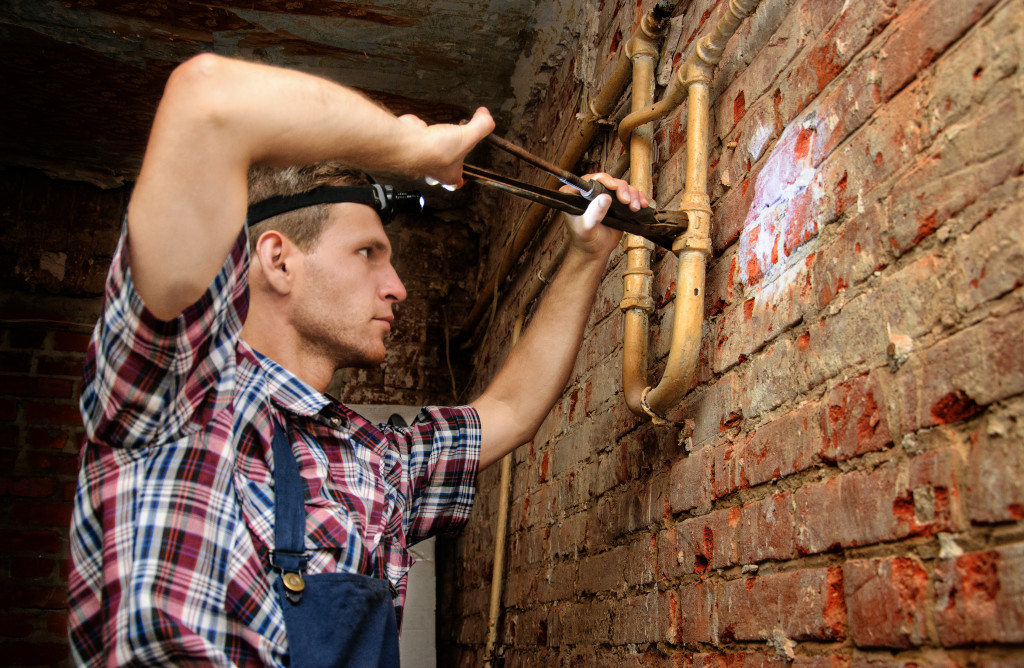Basement floods are a common problem across the United States. In fact, according to the Insurance Information Institute, thousands of dollars of property damage is caused by basement flooding each year.
If you live in an area prone to flooding, it’s essential to take preventative steps to protect your home and belongings. In this article, we will outline a few simple steps that you can take to minimize the damage caused by a flood.

Install a Sump Pump
A sump pump is a device that is installed in the lowest part of a basement or crawlspace. Its purpose is to remove any water that may accumulate in that area, preventing the space from flooding. Sump pumps are typically powered by electricity, and they work by pumping water out of the room and into a drainage system or nearby dry well. Some sump pumps also have backup power sources, such as batteries, in case of a power outage.
Installing a sump pump is one of the best ways to prevent basement flooding. It is essential to have the pump professionally installed to ensure that it is properly plumbed and wired. It is also necessary to have the proper size pump for your space, as too small of a pump may not be able to handle a giant flood.
Maintain Your Roof
One way to prevent basement floods is to maintain your roof. In the winter, heavy snowfall and ice can stress your roof and lead to leaks and cracks.
If left unrepaired, these leaks can allow water to enter your home and seep into your basement. To avoid this, make sure to clear any snow and ice from your roof after a storm and have any leaks or cracks repaired promptly by a professional.
If your roof is too old or damaged, it is best to install a new one. You can hire professional roof installers to get the job done seamlessly.
Install a Backup Generator
A backup generator is a worthwhile investment for any homeowner. It can provide peace of mind in the event of a power outage, but it can also help prevent basement floods. If your home is equipped with a sump pump, that pump will rely on electricity to operate.
In a power outage, the pump will not be able to do its job, and your basement could quickly flood. A backup generator can provide the power necessary to keep the sump pump running, even in an extended power outage. As a result, a backup generator can play an essential role in preventing basement floods.
Hence, if you live in an area prone to power outages, it is a good idea to install a backup generator. A backup generator will provide power to your home in a power outage, allowing your sump pump to continue functioning correctly.
Create Drainage Paths
One of the best ways to prevent basement flooding is to create drainage paths around the house’s perimeter. This can be done in trenches or by installing French drains.
Trenches should be at least six inches deep and six inches wide, and they should be filled with gravel. French drains are perforated pipes placed in channels and covered with gravel.
They collect water and direct it away from the house. To be effective, both trenches and French drains must be sloped so that water flows away from the foundation. If water is not adequately drained from the foundation, it can seep into the basement and cause flooding. By creating drainage paths, you can help to prevent this type of damage.
Keep Gutters Clean
Homeowners often don’t give their gutters much thought until they become clogged and cause water to back up, resulting in basement flooding. Clogged drains can also lead to landscape erosion and damaged foundations.
Fortunately, homeowners can take some simple steps to prevent these problems. First, it’s important to keep leaves and other debris out of the gutters. This can be done by installing gutter guards or regularly cleaning the gutters.
Additionally, it’s good to direct downspouts away from the house to prevent pooling water around the foundation. By taking these precautions, homeowners can help keep their basement dry and their foundation in good condition.
Each spring and fall, it’s essential to clean your gutters to prevent leaves and debris from clogging them and causing water damage to your home. The best time to clean your gutters is in the morning when the air is still fantastic.
First, use a ladder to remove any visible leaf build-up. Next, use a garden hose fitted with a nozzle attachment to flush any remaining debris. Finally, use a brush or broom to scrub the sides of the gutters clean.
For hard-to-reach areas, you may need to use a gutter cleaning tool. With regular maintenance, cleaning your gutters should only take a few minutes each season. Or you can call out professionals for help.
If you follow these simple tips, you can help reduce the chances of a basement flood. For more information, contact your local insurance agent.


